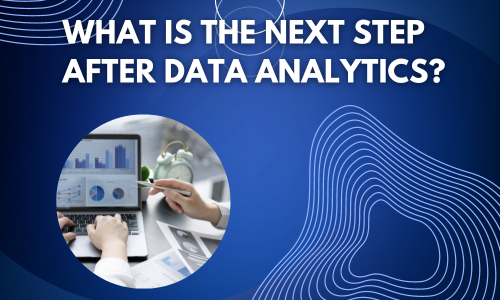Table of Contents
ToggleAfter data analytics, the next step is often to use the insights gained from the data analysis to inform decision-making or take action.
Depending on the specific goals of the data analysis, the next step could involve a variety of activities such as:
Data visualization: presenting the results of the analysis in a clear and visually appealing way to communicate the insights to stakeholders.
Predictive modeling: using the data to build a model that can predict future outcomes or behaviors.
Learn the core concepts of Data Analytics Course video on Youtube:
Pursue a career in Data Analytics with the number one training institute 360DigiTMG. Enroll in the best Data Analytics Course to start your journey.
Business intelligence: using the insights gained from the analysis to inform strategic decision-making or identify opportunities for improvement.
Optimization: using the data to identify ways to optimize processes, resources, or systems.
Machine learning: using the data to train machine learning models that can automate or improve decision-making processes.
The next step after data analytics will depend on the specific goals and objectives of the analysis, as well as the needs and priorities of the organization or individual conducting the analysis. The next steps after data analytics might involve:
Wish to pursue a career in data analytics? Enroll in this Data Analytics Course in Bangalore to start your journey.
Data Visualization:
Once the data analysis is complete, it is essential to present the insights in a way that is easy to understand for stakeholders. This is where data visualization comes into play. Data visualization is the process of representing data in a graphical or pictorial format, making it easier for people to understand and interpret. There are many tools available to help with data visualization, such as Tableau, Power BI, and Excel. The goal of data visualization is to help stakeholders understand the insights and make data-driven decisions.
Kickstart your career by enrolling in this Data Analytics Course in Pune.
Predictive Modeling:
Predictive modeling involves using the data to create a model that can predict future outcomes or behaviors. This is often used in industries such as finance, healthcare, and marketing. Predictive modeling uses statistical algorithms and machine learning techniques to analyze historical data and identify patterns that can be used to make predictions about the future. Predictive modeling can be used to forecast sales, identify customers at risk of leaving, or predict equipment failure.
Business Intelligence:
Business intelligence (BI) is the process of using data analytics to drive business decisions. BI involves collecting, analyzing, and presenting data in a way that helps stakeholders understand the business’s performance and identify areas for improvement. BI tools such as dashboards and scorecards can help stakeholders monitor key performance indicators (KPIs) and make data-driven decisions. BI can help businesses optimize their operations, reduce costs, and improve customer satisfaction.
Wish to pursue career in data analytics? Enroll in the Data Analytics Course in Hyderabad to start your journey.
Optimization:
Optimization involves using the insights gained from the data analysis to identify ways to improve processes, systems, or resources. This can involve using mathematical models and algorithms to find the best possible solution. For example, optimization can be used to determine the most efficient route for delivery drivers, the optimal staffing levels for a call center, or the best pricing strategy for a product.
Machine Learning:
Machine learning is a subset of artificial intelligence (AI) that involves training algorithms to learn from data and make predictions or decisions without being explicitly programmed. Machine learning can be used to automate decision-making processes, identify patterns in data, and improve predictions. For example, machine learning can be used to predict which customers are most likely to churn, classify spam emails, or detect fraud.
Action Planning:
Once the data analysis is complete, it’s important to develop an action plan based on the insights gained. The action plan should be specific, measurable, achievable, relevant, and time-bound (SMART). The plan should outline the steps needed to achieve the desired outcome, who is responsible for each step, and when the steps will be completed.
Data Science Placement Success Story
Looking forward to becoming Data analyst? check out the Data Analyst Course in Chennai and get certified today.
Continuous Improvement:
Data analysis is an ongoing process, and it’s important to continuously monitor and improve the process. This involves reviewing the data analysis process periodically to ensure that it is still meeting the organization’s needs, refining data collection methods, and incorporating new data sources. Additionally, it involves identifying areas for improvement and implementing changes to improve the accuracy and reliability of the analysis.
Communication:
Effective communication of the insights gained from data analysis is essential to ensure that stakeholders understand the insights and can use them to make informed decisions. Communication can involve creating reports, presentations, or dashboards to visualize the insights and present them in a way that is easy to understand for different audiences.
Testing and Validation:
It’s important to test and validate the data analysis process to ensure that the insights gained are accurate and reliable. This involves using statistical tests, hypothesis testing, or other validation methods to confirm the validity of the insights.
Integration:
Integrating the insights gained from data analysis into business processes and decision-making is essential to realize the full value of the analysis. This involves incorporating the insights into existing workflows and decision-making processes, using them to inform strategic planning, and ensuring that they align with the organization’s goals and priorities.
The next step after data analytics depends on the specific goals and objectives of the analysis. However, some common next steps include data visualization, predictive modeling, business intelligence, optimization, and machine learning. By taking these steps, businesses can use the insights gained from data analytics to drive better decision-making, optimize their operations, and improve overall performance.
Data Science Training Institutes in Other Locations
Tirunelveli, Kothrud, Ahmedabad, Hebbal, Chengalpattu, Borivali, Udaipur, Trichur, Tiruchchirappalli, Srinagar, Ludhiana, Shimoga, Shimla, Siliguri, Rourkela, Roorkee, Pondicherry, Rajkot, Ranchi, Rohtak, Pimpri, Moradabad, Mohali, Meerut, Madurai, Kolhapur, Khammam, Jodhpur, Jamshedpur, Jammu, Jalandhar, Jabalpur, Gandhinagar, Ghaziabad, Gorakhpur, Gwalior, Ernakulam, Erode, Durgapur, Dombivli, Dehradun, Cochin, Bhubaneswar, Bhopal, Anantapur, Anand, Amritsar, Agra , Kharadi, Calicut, Yelahanka, Salem, Thane, Andhra Pradesh, Greater Warangal, Kompally, Mumbai, Anna Nagar, ECIL, Guduvanchery, Kalaburagi, Porur, Chromepet, Kochi, Kolkata, Indore, Navi Mumbai, Raipur, Coimbatore, Bhilai, Dilsukhnagar, Thoraipakkam, Uppal, Vijayawada, Vizag, Gurgaon, Bangalore, Surat, Kanpur, Chennai, Aurangabad, Hoodi,Noida, Trichy, Mangalore, Mysore, Delhi NCR, Chandigarh, Guwahati, Guntur, Varanasi, Faridabad, Thiruvananthapuram, Nashik, Patna, Lucknow, Nagpur, Vadodara, Jaipur, Hyderabad, Pune, Kalyan.
Data Analyst Courses In Other Locations
Tirunelveli, Kothrud, Ahmedabad, Chengalpattu, Borivali, Udaipur, Trichur, Tiruchchirappalli, Srinagar, Ludhiana, Shimoga, Shimla, Siliguri, Rourkela, Roorkee, Pondicherry, Rohtak, Ranchi, Rajkot, Pimpri, Moradabad, Mohali, Meerut, Madurai, Kolhapur, Khammam, Jodhpur, Jamshedpur, Jammu, Jalandhar, Jabalpur, Gwalior, Gorakhpur, Ghaziabad, Gandhinagar, Erode, Ernakulam, Durgapur, Dombivli, Dehradun, Bhubaneswar, Cochin, Bhopal, Anantapur, Anand, Amritsar, Agra, Kharadi, Calicut, Yelahanka, Salem, Thane, Andhra Pradesh, Warangal, Kompally, Mumbai, Anna Nagar, Dilsukhnagar, ECIL, Chromepet, Thoraipakkam, Uppal, Bhilai, Guduvanchery, Indore, Kalaburagi, Kochi, Navi Mumbai, Porur, Raipur, Vijayawada, Vizag, Surat, Kanpur, Aurangabad, Trichy, Mangalore, Mysore, Chandigarh, Guwahati, Guntur, Varanasi, Faridabad, Thiruvananthapuram, Nashik, Patna, Lucknow, Nagpur, Vadodara, Jaipur, Hyderabad, Pune, Kalyan, Delhi, Kolkata, Noida, Chennai, Bangalore, Gurgaon, Coimbatore.
For more information
360DigiTMG – Data Analytics, Data Science Course Training Hyderabad
Address – 2-56/2/19, 3rd floor,,
Vijaya towers, near Meridian school,,
Ayyappa Society Rd, Madhapur,,
Hyderabad, Telangana 500081
099899 94319
https://goo.gl/maps/sn21C9xFtMbCr4qm8
Source Link : What are the Best IT Companies in Uppal

